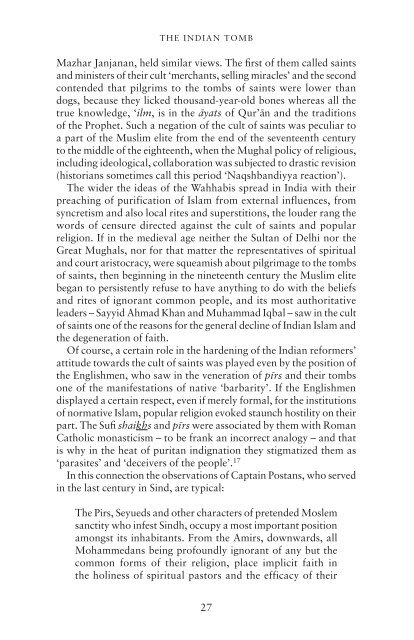Muslim Saints of South Asia: The eleventh to ... - blog blog blog
Muslim Saints of South Asia: The eleventh to ... - blog blog blog
Muslim Saints of South Asia: The eleventh to ... - blog blog blog
You also want an ePaper? Increase the reach of your titles
YUMPU automatically turns print PDFs into web optimized ePapers that Google loves.
THE INDIAN TOMB<br />
Mazhar Janjanan, held similar views. <strong>The</strong> first <strong>of</strong> them called saints<br />
and ministers <strong>of</strong> their cult ‘merchants, selling miracles’ and the second<br />
contended that pilgrims <strong>to</strong> the <strong>to</strong>mbs <strong>of</strong> saints were lower than<br />
dogs, because they licked thousand-year-old bones whereas all the<br />
true knowledge, ‘ilm, is in the āyats <strong>of</strong> Qur’ān and the traditions<br />
<strong>of</strong> the Prophet. Such a negation <strong>of</strong> the cult <strong>of</strong> saints was peculiar <strong>to</strong><br />
a part <strong>of</strong> the <strong>Muslim</strong> elite from the end <strong>of</strong> the seventeenth century<br />
<strong>to</strong> the middle <strong>of</strong> the eighteenth, when the Mughal policy <strong>of</strong> religious,<br />
including ideological, collaboration was subjected <strong>to</strong> drastic revision<br />
(his<strong>to</strong>rians sometimes call this period ‘Naqshbandiyya reaction’).<br />
<strong>The</strong> wider the ideas <strong>of</strong> the Wahhabis spread in India with their<br />
preaching <strong>of</strong> purification <strong>of</strong> Islam from external influences, from<br />
syncretism and also local rites and superstitions, the louder rang the<br />
words <strong>of</strong> censure directed against the cult <strong>of</strong> saints and popular<br />
religion. If in the medieval age neither the Sultan <strong>of</strong> Delhi nor the<br />
Great Mughals, nor for that matter the representatives <strong>of</strong> spiritual<br />
and court aris<strong>to</strong>cracy, were squeamish about pilgrimage <strong>to</strong> the <strong>to</strong>mbs<br />
<strong>of</strong> saints, then beginning in the nineteenth century the <strong>Muslim</strong> elite<br />
began <strong>to</strong> persistently refuse <strong>to</strong> have anything <strong>to</strong> do with the beliefs<br />
and rites <strong>of</strong> ignorant common people, and its most authoritative<br />
leaders – Sayyid Ahmad Khan and Muhammad Iqbal – saw in the cult<br />
<strong>of</strong> saints one <strong>of</strong> the reasons for the general decline <strong>of</strong> Indian Islam and<br />
the degeneration <strong>of</strong> faith.<br />
Of course, a certain role in the hardening <strong>of</strong> the Indian reformers’<br />
attitude <strong>to</strong>wards the cult <strong>of</strong> saints was played even by the position <strong>of</strong><br />
the Englishmen, who saw in the veneration <strong>of</strong> pīrs and their <strong>to</strong>mbs<br />
one <strong>of</strong> the manifestations <strong>of</strong> native ‘barbarity’. If the Englishmen<br />
displayed a certain respect, even if merely formal, for the institutions<br />
<strong>of</strong> normative Islam, popular religion evoked staunch hostility on their<br />
part. <strong>The</strong> Sufi shaikhs and pīrs were associated by them with Roman<br />
Catholic monasticism – <strong>to</strong> be frank an incorrect analogy – and that<br />
is why in the heat <strong>of</strong> puritan indignation they stigmatized them as<br />
‘parasites’ and ‘deceivers <strong>of</strong> the people’. 17<br />
In this connection the observations <strong>of</strong> Captain Postans, who served<br />
in the last century in Sind, are typical:<br />
<strong>The</strong> Pirs, Seyueds and other characters <strong>of</strong> pretended Moslem<br />
sanctity who infest Sindh, occupy a most important position<br />
amongst its inhabitants. From the Amirs, downwards, all<br />
Mohammedans being pr<strong>of</strong>oundly ignorant <strong>of</strong> any but the<br />
common forms <strong>of</strong> their religion, place implicit faith in<br />
the holiness <strong>of</strong> spiritual pas<strong>to</strong>rs and the efficacy <strong>of</strong> their<br />
27


